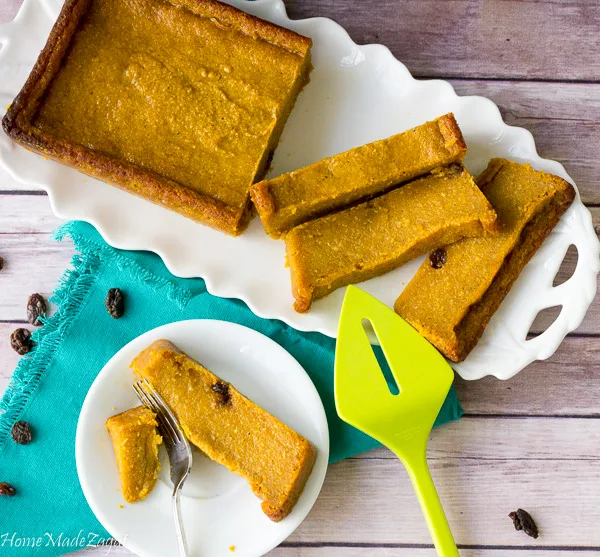Caribbean Pone
15.2.16
| Recipe by Renz
A spicy, mouthwatering pudding like baked dessert made from cassava, sweet
potato and pumpkins.
Are you ready to dive into this kinda pudding but not a cake goodness?
A few posts back I mentioned that in the Caribbean we used ground provision for a lot of things. If you are wondering what "ground provision" is I go into detail in my "What is ground provision" post.
We eat provision as a side, include it in our soups, or make dishes with them being the main ingredient.
Pone is one of those dishes that we use as a main ingredient. It is made from either a variety of ground provisions (Cassava (yuca) pone, sweet potato pone, and even corn pone) or a mixture of them which is this recipe.
This is a popular Caribbean baked treat.
Do you ever hear the name of something and wonder how they came up with that name? Who decided that a root vegetable baked in coconut milk with some spices should be a "pone"?
And that is basically what pone is. It's a baked pudding dish that can be made out, of most popularly, cassava, pumpkin, coconut, corn and a mixture of them combined.
But the reason for the name does not matter. Honestly, I don't think it will deter me from eating this.
I can't even say it's a cake or not, it's definitely closer to a pudding but with so much more flavor. You get the taste of the cassava and coconut then a shot of spices at the end.
Traditionally the process of making pone included grating everything down before putting it to bake.
The coconut needs to be husked, cut up (or broken open), separated from the shell then grated. Just like how we make our coconut milk.
All the main ingredients cassava, sweet potato, and coconut, need to be grated. Then we combine that with all the amazing spices.
The spices are what make the flavor stand out. Cinnamon, nutmeg, black pepper for a little spice. And when baking the smell transforms your house.
Initially, and some people would still say it is what must be done, the ground provisions were grated using a manual grater.
The process was long. But now using a food processor or a blender makes things much easier.
You can also use packaged desiccated coconut as a replacement for fresh coconut that you have to cut and grate, but I would only do that if it's really really your only option.
Finding Caribbean sweet potato is sometimes difficult, so you can resort to the orange sweet potato. The color of the pone would vary based on what sweet potato you use.
The shelf life on pone is about 2 days maximum. It spoils quickly.
The best thing to do is to put it in the fridge a day after making it. It is best to wrap it in cling wrap then place the wrapped pone in a zip-loc bag and put it in the fridge.
Some people like to eat it cold and with some ice cream. So you can just slice away.
You can also warm it up in the toaster oven or just bring it to room temperature if you prefer.
I really can go through a lot of slices of this.
You hear cries of "Oh gosh, put the pone away before I eat it all", "Please give some of that pone away", "Who decided to make pone when I'm trying to lose weight" while everybody is taking one more "small" slice."
It really is one of those things where you just can't stop eating it because it's so delicious.
Another great Caribbean dish that I hope you will definitely try.
Try out some of my other Caribbean desserts:
Are you ready to dive into this kinda pudding but not a cake goodness?
A few posts back I mentioned that in the Caribbean we used ground provision for a lot of things. If you are wondering what "ground provision" is I go into detail in my "What is ground provision" post.
We eat provision as a side, include it in our soups, or make dishes with them being the main ingredient.
Pone is one of those dishes that we use as a main ingredient. It is made from either a variety of ground provisions (Cassava (yuca) pone, sweet potato pone, and even corn pone) or a mixture of them which is this recipe.
This is a popular Caribbean baked treat.
What is pone?
Do you ever hear the name of something and wonder how they came up with that name? Who decided that a root vegetable baked in coconut milk with some spices should be a "pone"?
And that is basically what pone is. It's a baked pudding dish that can be made out, of most popularly, cassava, pumpkin, coconut, corn and a mixture of them combined.
But the reason for the name does not matter. Honestly, I don't think it will deter me from eating this.
I can't even say it's a cake or not, it's definitely closer to a pudding but with so much more flavor. You get the taste of the cassava and coconut then a shot of spices at the end.
How to make pone
Traditionally the process of making pone included grating everything down before putting it to bake.
The coconut needs to be husked, cut up (or broken open), separated from the shell then grated. Just like how we make our coconut milk.
All the main ingredients cassava, sweet potato, and coconut, need to be grated. Then we combine that with all the amazing spices.
The spices are what make the flavor stand out. Cinnamon, nutmeg, black pepper for a little spice. And when baking the smell transforms your house.
Tips and Tricks
Initially, and some people would still say it is what must be done, the ground provisions were grated using a manual grater.
The process was long. But now using a food processor or a blender makes things much easier.
You can also use packaged desiccated coconut as a replacement for fresh coconut that you have to cut and grate, but I would only do that if it's really really your only option.
Finding Caribbean sweet potato is sometimes difficult, so you can resort to the orange sweet potato. The color of the pone would vary based on what sweet potato you use.
Storage and reheating
The shelf life on pone is about 2 days maximum. It spoils quickly.
The best thing to do is to put it in the fridge a day after making it. It is best to wrap it in cling wrap then place the wrapped pone in a zip-loc bag and put it in the fridge.
Some people like to eat it cold and with some ice cream. So you can just slice away.
You can also warm it up in the toaster oven or just bring it to room temperature if you prefer.
I really can go through a lot of slices of this.
You hear cries of "Oh gosh, put the pone away before I eat it all", "Please give some of that pone away", "Who decided to make pone when I'm trying to lose weight" while everybody is taking one more "small" slice."
It really is one of those things where you just can't stop eating it because it's so delicious.
Another great Caribbean dish that I hope you will definitely try.
Try out some of my other Caribbean desserts:






How are you, I'm am go make this pone haven't made it for a while,thanks for this recipe
ReplyDeleteI need to make some myself too. You are welcome.
DeleteTHANKS I KNOW WHEN YOU WRITE OUT A RECIPE ,ITS PERFECT I LOVE YOUR RECIPES
ReplyDeleteThank you!!
DeleteHey there! Gabriela here, I was unable to sign in!
ReplyDeleteI’m so eager to make this ever since it appeared as a suggestion on my explore tab on Instagram, thank you, algorithm! 👏🏼👏🏼👏🏼
I was wondering, though, about the nutrition facts, what portion size do they work for? 30g? 40g? Thank you so so much!